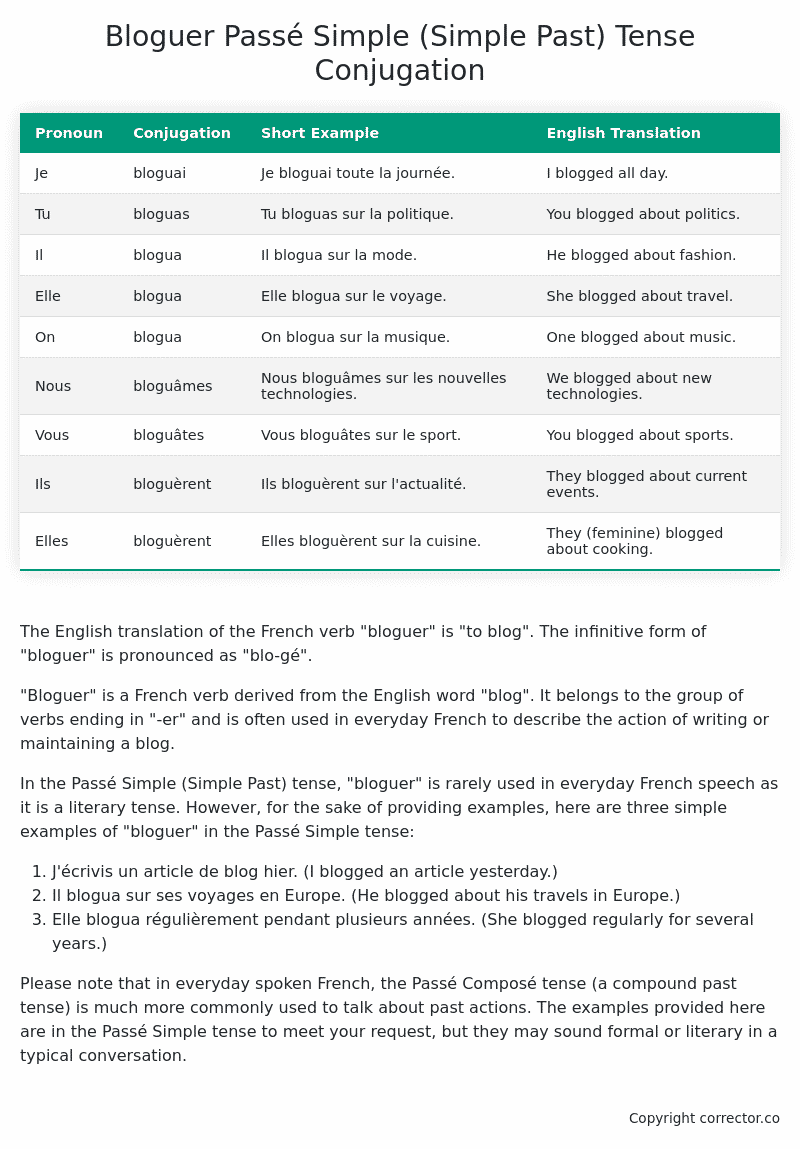Passé Simple (Simple Past) Tense Conjugation of the French Verb bloguer
Introduction to the verb bloguer
The English translation of the French verb “bloguer” is “to blog”. The infinitive form of “bloguer” is pronounced as “blo-gé”.
“Bloguer” is a French verb derived from the English word “blog”. It belongs to the group of verbs ending in “-er” and is often used in everyday French to describe the action of writing or maintaining a blog.
In the Passé Simple (Simple Past) tense, “bloguer” is rarely used in everyday French speech as it is a literary tense. However, for the sake of providing examples, here are three simple examples of “bloguer” in the Passé Simple tense:
- J’écrivis un article de blog hier. (I blogged an article yesterday.)
- Il blogua sur ses voyages en Europe. (He blogged about his travels in Europe.)
- Elle blogua régulièrement pendant plusieurs années. (She blogged regularly for several years.)
Please note that in everyday spoken French, the Passé Composé tense (a compound past tense) is much more commonly used to talk about past actions. The examples provided here are in the Passé Simple tense to meet your request, but they may sound formal or literary in a typical conversation.
Table of the Passé Simple (Simple Past) Tense Conjugation of bloguer
| Pronoun | Conjugation | Short Example | English Translation |
|---|---|---|---|
| Je | bloguai | Je bloguai toute la journée. | I blogged all day. |
| Tu | bloguas | Tu bloguas sur la politique. | You blogged about politics. |
| Il | blogua | Il blogua sur la mode. | He blogged about fashion. |
| Elle | blogua | Elle blogua sur le voyage. | She blogged about travel. |
| On | blogua | On blogua sur la musique. | One blogged about music. |
| Nous | bloguâmes | Nous bloguâmes sur les nouvelles technologies. | We blogged about new technologies. |
| Vous | bloguâtes | Vous bloguâtes sur le sport. | You blogged about sports. |
| Ils | bloguèrent | Ils bloguèrent sur l’actualité. | They blogged about current events. |
| Elles | bloguèrent | Elles bloguèrent sur la cuisine. | They (feminine) blogged about cooking. |
Other Conjugations for Bloguer.
Le Present (Present Tense) Conjugation of the French Verb bloguer
Imparfait (Imperfect) Tense Conjugation of the French Verb bloguer
Passé Simple (Simple Past) Tense Conjugation of the French Verb bloguer (You’re reading it right now!)
Passé Composé (Present Perfect) Tense Conjugation of the French Verb bloguer
Futur Simple (Simple Future) Tense Conjugation of the French Verb bloguer
Futur Proche (Near Future) Tense Conjugation of the French Verb bloguer
Plus-que-parfait (Pluperfect) Tense Conjugation of the French Verb bloguer
Passé Antérieur (Past Anterior) Tense Conjugation of the French Verb bloguer
Futur Antérieur (Future Anterior) Tense Conjugation of the French Verb bloguer
Subjonctif Présent (Subjunctive Present) Tense Conjugation of the French Verb bloguer
Subjonctif Passé (Subjunctive Past) Tense Conjugation of the French Verb bloguer
Subjonctif Imparfait (Subjunctive Imperfect) Tense Conjugation of the French Verb bloguer
Subjonctif Plus-que-parfait (Subjunctive Pluperfect) Tense Conjugation of the French Verb bloguer
Conditionnel Présent (Conditional Present) Tense Conjugation of the French Verb bloguer
Conditionnel Passé (Conditional Past) Tense Conjugation of the French Verb bloguer
Conditionnel Passé II (Conditional Past II) Tense Conjugation of the French Verb bloguer
L’impératif Présent (Imperative Present) Tense Conjugation of the French Verb bloguer
L’impératif Passé (Imperative Past) Tense Conjugation of the French Verb bloguer
L’infinitif Présent (Infinitive Present) Tense Conjugation of the French Verb bloguer
L’infinitif Passé (Infinitive Past) Tense Conjugation of the French Verb bloguer
Le Participe Présent (Present Participle) Tense Conjugation of the French Verb bloguer
Le Participe Passé (Past Participle) Tense Conjugation of the French Verb bloguer
Struggling with French verbs or the language in general? Why not use our free French Grammar Checker – no registration required!
Get a FREE Download Study Sheet of this Conjugation 🔥
Simply right click the image below, click “save image” and get your free reference for the bloguer Passé Simple tense conjugation!

Bloguer – About the French Passé Simple (Simple Past) Tense
Formation
Usage
Narration
Historical Context
Interactions with other tenses
Passé Composé
Imparfait
Conditional and Subjunctive
Summary
I hope you enjoyed this article on the verb bloguer. Still in a learning mood? Check out another TOTALLY random French verb conjugation!


